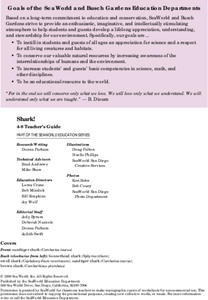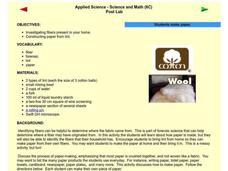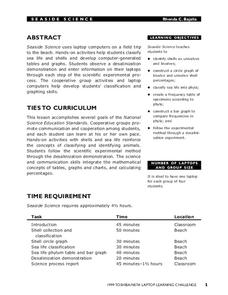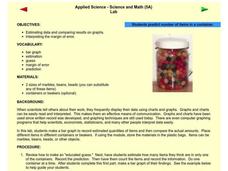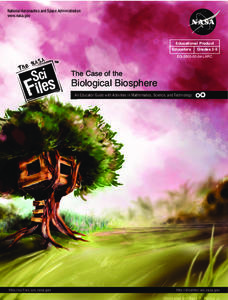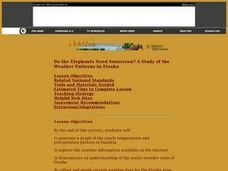Curated OER
Plant Growth and Carbon Dioxide
Young scientists show how carbon dioxide in the air affects plant growth. This math and science instructional activity provides a good platform for learners to combine scientific knowledge with mathematical representation of data. A...
Curated OER
Speed and Acceleration
In this speed and acceleration worksheet, students complete math word problems having to do with speed and acceleration. Students complete 13 problems.
Curated OER
The Integration of Science and Math Through Ecosystems
Students use the disciplines of math and science to examine ecosystems. In groups, they calculate the amount of supplies they would need to live in the classroom for one day, a week and a year. Using this information, they apply it to...
Curated OER
Math Club #5: Miscellaneous II
In this math club #5: miscellaneous II learning exercise, 6th graders work in groups to solve 10 miscellaneous word problems using logic and problem solving skills.
Curated OER
Managing Nutrients in Livestock Manure
Livestock managers reinforce math and science skills while learning about the nutrients found in manure. They predict which animal produces the largest amount and which animal's manure contains the most nitrogen. Finally, they compare...
National Nanotechnology Infrastructure Network
Noodling Around: Powers of Ten
How many noodles long is your classroom? Find out when engineers of all ages explore measurement through the use of pool noodles. With the noodles pre-cut to certain metric lengths, the activities could be used to introduce the metric...
SeaWorld
Shark!
Here is an impressive collection of lessons on sharks. In them, pupils undertake a serious study of sharks, their habitats, their social structure, and how humans adversely impact their existence. These lessons effectively integrate...
Curated OER
Making Regolith
You may not be able to take a field trip to the moon, but that doesn't mean your class can't study moon rocks. Using graham crackers as the moon's bedrock and powdered donuts as micrometeorites, young scientists simulate...
Curated OER
Get a Leg Up
Traveling through space is an amazing experience, but it definitely takes a toll on the body. After reading an article and watching a brief video, learners perform an experiment that simulates the effects of zero gravity on the...
Science 4 Inquiry
Musical Vibes with Palm Pipes
Ancient people used musical pipes as early as the third millennium BCE. Young scientists explore the workings of musical pipes to better understand the relationship with frequency, length of pipe, and sound waves. They determine the...
Curated OER
Balloons: Math with the Montgolfier Balloon
Students discover the history of hot air balloons by watching one ascent. For this physics lesson, students utilize a Montgolfier Hot Air Balloon from an earlier lesson and record the temperature, rate of ascent and the volume....
Curated OER
Science of Special Effects
This is a creative, multidisciplinary, well-designed instructional activity provided by Scientific American related to special effects. Students make their own animated short films and use math and computer skills.
Curated OER
Symmetry in Paper Airplanes
Students explore symmetry. In this geometry and scientific inquiry lesson, students design paper airplanes with middle line symmetry, as well as right, obtuse, and acute angles. Students measure the plane's angles using a...
Curated OER
Applied Science - Science and Math Post-Lab
Students explore optical illusions. In this Applied Science instructional activity, students view optical illusions and record the data of what they see. Students graph the data that they collect.
Curated OER
Applied Science - Science and Math Lab
Students examine fabric. In this Applied Science lesson, students look at the fibers of fabric through a microscope. Students compare and contrast a variety of fibers.
Curated OER
Applied Science - Science and Math Post Lab
Young scholars construct paper. In this applied Science activity, students create paper using lint. Young scholars investigate the different fibers in their homes.
Curated OER
Applied Science - Science and Math Lab
Students explore the senses. In this Applied Science lesson, students investigate the items in "feely" boxes with their hands, both touching the items and shaking the boxes to hear the sound the items make. Students also smell and taste...
Curated OER
Applied Science - Science and Math Post Lab
Students utilize a balance scale. For this applied science lesson, students compare the weights of two objects using an elementary balance scale. Students balance the scale with weights to find how heavy an object is.
Curated OER
Plants and Animals, Partners in Pollination
Students participate in multiple hands-on activities to explore reproduction and pollination. In groups, using a cotton swab and powder, students simulate being pollinators and plants. They name the parts of the flowers and the function...
Curated OER
Seaside Science
Learners research sea life using laptop computers. In this sea life lesson, students participate in a field trip to the beach and enter observations into their laptop computers. Learners classify shells and sea life.
Curated OER
Applied Science - Science and Math Lab
Learners make a prediction. In this applied science lesson, students guess the number of items in a jar. Learners create a bar graph to show the predictions and the actual amounts.
Curated OER
The Case of the Biological Biosphere: Health, Math, Technology
Learners investigate various aspects of the human body in this imaginative Tree House Detective episode about the biological biosphere. In a series of They take measurements, analyze data, and use technology. The lessons...
Curated OER
Do the Elephants Need Sunscreen? A Study of the Weather Patterns in Etosha
Students analyze the weather patterns in Namibia. They create a graph of the yearly temperatures and use the internet to gather information. They discuss how the weather goes in cycles in the area.
Curated OER
Swing in Time
Young scholars examine the motion of pendulums and come to understand that the longer the string of the pendulum, the fewer the number of swings in a given time interval. They see that changing the weight on the pendulum does not have an...






